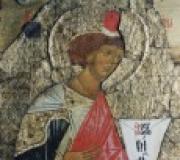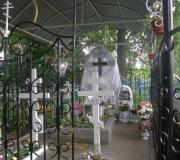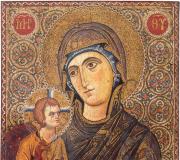Who came to Oblomov? Characteristics of Oblomov's guests
hero Oblomov Stolz
I.A. was not spared. Goncharov and guests of Ilya Ilyich. Each of them has their own portrait, although not very complete. Thanks to this, the reader creates an image of those people with whom the main character communicated. Let's get to know some of them.
Volkov comes first: “...a young man of about twenty-five, shining in health, with laughing cheeks, lips and eyes. Envy took me to look at him.” Goncharov, I.A. Oblomov. A novel in 4 parts. - M.: Fiction, 1984. - 493 p. - P. 32 He dazzled with the freshness of his face, his linen, and his tailcoat. He had a shiny hat and patent leather boots. And as Oblomov himself correctly called him, “a brilliant gentleman.”
Sudbinsky appears in a different image to the reader. This is “a gentleman in a dark green tailcoat with coat of arms buttons, clean-shaven... with a weary, but calmly conscious expression in his eyes, with a heavily worn face, with a thoughtful smile.” Right there. - P. 36 These features are not accidental, because this guest is the head of the department.
Another guest, Alekseev, was a man “... of uncertain years, with an uncertain physiognomy... neither handsome nor ugly, neither tall nor short, neither blond nor dark-haired...”. Right there. - P. 44 As the writer notes, nature did not give this character any noticeable features.
The portrait of Mikhei Andreevich Tarantiev is given more fully. This is “a man of about forty...tall, bulky in the shoulders and throughout the body, with large facial features, a large head...short neck, with large protruding eyes, thick lips.” Right there. - P. 52 He did not pursue the elegance of his suit, he was not always shaved... But all this, it seems, did not bother the hero himself. Tarantiev is unkind to everything around him, scolds everything and everyone. He has been working in the office for twenty-five years. Sometimes he is like a child: he overlooks something, misses something.
It is this description of Oblomov’s guests that is especially detailed, since I.A. Goncharov brings this hero closer to Oblomov. The point is not even that they have one small homeland, but also that both Tarantyev and Oblomov were left with their unrealistic hopes, although somewhere inside they were full of dormant forces.
I.A. Goncharov puts portraits of the above characters at the very beginning of the chapter, which allows the reader to immediately imagine the image of Oblomov’s guest, and then follow the conversation of the characters.
Portrait of Zakhar
Zakhar is the servant of Ilya Ilyich. Despite the fact that he is a simple man of low class, I.A. Goncharov also created his portrait. The servant was over fifty years old, with “immensely wide and thick gray-blond sideburns.” The image is complemented by clothes: a gray frock coat and vest, which the character really liked, but this is all at the beginning of the novel. At the end, a sad portrait is given: “...he had patches on his elbows; he looked so poor and hungry, as if he ate poorly, slept little and was working for three people.” Goncharov, I.A. Oblomov. A novel in 4 parts. - M.: Fiction, 1984. - 493 pp. - P. 427 This is how Zakhar changed while in Pshenitsyna’s house.
It is interesting that I.A. Goncharov complements the portrait with some character traits and habits of the servant. For example, the reader learns that Zakhar is a gossip, ready to scold the master at any opportunity, loves to drink, and sometimes steals from Oblomov.
Zakhar is unpleasant (he rarely shaves). Very awkward, slow, clumsy. Even when he tries to please the master, everything happens completely the opposite. “There is no end to troubles and losses” from such a servant.
Despite all his shortcomings and repulsive properties, Zakhar is passionately devoted to the master; he would die instead of the master if necessary, since he considered it his duty.
(16 )
Characteristics of Ilya Ilyich Oblomov very ambiguous. Goncharov created it complex and mysterious. Oblomov separates himself from the outside world, fences himself off from it. Even his home bears little resemblance to habitation.
From early childhood, he saw a similar example from his relatives, who also fenced themselves off from the outside world and protected it. It was not customary to work in his home. When he, as a child, played snowballs with peasant children, they then warmed him up for several days. In Oblomovka they were wary of everything new - even a letter that came from a neighbor, in which he asked for a beer recipe, was afraid to open for three days.
But Ilya Ilyich remembers his childhood with joy. He idolizes the nature of Oblomovka, although this is an ordinary village, not particularly remarkable. He was brought up by rural nature. This nature instilled in him poetry and a love of beauty.
Ilya Ilyich does nothing, just complains about something all the time and engages in verbiage. He is lazy, does nothing himself and does not expect anything from others. He accepts life as it is and does not try to change anything in it.
When people come to him and tell him about their lives, he feels that in the bustle of life they forget that they are wasting their lives in vain... And he does not need to fuss, act, does not need to prove anything to anyone. Ilya Ilyich simply lives and enjoys life.
It's hard to imagine him in motion, he looks funny. At rest, lying on the sofa, it is natural. He looks at ease - this is his element, his nature.
Let's summarize what we read:
- Appearance of Ilya Oblomov. Ilya Ilyich is a young man, 33 years old, of good appearance, of average height, plump. The softness of his facial expression showed him to be a weak-willed and lazy person.
- Family status. At the beginning of the novel, Oblomov is not married, he lives with his servant Zakhar. At the end of the novel he gets married and is happily married.
- Description of the home. Ilya lives in St. Petersburg in an apartment on Gorokhovaya Street. The apartment is neglected; the servant Zakhar, who is as lazy as the owner, rarely sneaks into it. A special place in the apartment is occupied by a sofa, on which Oblomov lies around the clock.
- Behavior and actions of the hero. Ilya Ilyich can hardly be called an active person. Only his friend Stolz manages to bring Oblomov out of his slumber. The main character is lying on the sofa and only dreams that he will soon get up from it and take care of business. He cannot even solve pressing problems. His estate has fallen into disrepair and is not bringing in any money, so Oblomov doesn’t even have money to pay the rent.
- The author's attitude towards the hero. Goncharov has sympathy for Oblomov; he considers him a kind, sincere person. At the same time, he sympathizes with him: it is a pity that a young, capable, not stupid man has lost all interest in life.
- My attitude towards Ilya Oblomov. In my opinion, he is too lazy and weak-willed, and therefore cannot command respect. At times he just infuriates me, I want to go up and shake him. I don't like people who live their lives so mediocrely. Perhaps I react so strongly to this hero because I feel the same shortcomings in myself.
Question No. 1
Checking oral homework (question survey)
Be able to characterize the hero by describing his appearance, life, interior
Know the main issues of the work;
Know the artistic features of the work;
Creativity I.A. Goncharova.
Lesson No. 5
The novel “Oblomov”: what is Oblomovism?
Goals:
Progress of the lesson:
1. Organizational moment, goals:
2. Update:
Tell us who Ilya Ilyich Oblomov is, what problems brought him out of his state of peace of mind?
“He was a man about thirty-two or three years old, of average height, pleasant appearance, with dark gray eyes, but with the absence of any definite idea, any concentration in his facial features. The thought walked like a free bird across the face, fluttered in the eyes, sat on half-open lips, hid in the folds of the forehead, then completely disappeared, and then an even light of carelessness glowed throughout the face. From the face, carelessness passed into the poses of one’s body... softness, which was the dominant expression, not only of the face, but of the whole soul... rarely did anxiety solidify in the form of a definite idea, even more rarely did it turn into intention...
...the appearance of the office struck me with the neglect and negligence that dominated it...
“Oblomov was brought out of his rut by the following news he received: a letter from the headman from the village that the income from the estate had decreased by two thousand rubles, the news that he urgently needed to move out of the apartment.
Tell us about Oblomov’s guests: who they are, how Oblomov evaluates their activities.
Volkov, serves in the army, is a well-groomed man, interested only in high society news, loves to dress well, look smart and neat. Oblomov says about him: “Where is the man here? What does it fragment and crumble into?”;
Sudbinsky, Oblomov's old colleague. He rose to the rank of head of the department, a formalist who thinks only about distinction in front of his superiors. Oblomov says about him: “Stuck... and blind, and deaf, and dumb for everything else in the world... And he will live out his life and many, many things will not move in it...”;
Penkin, a mediocre scribbler who is interested in advanced issues of women's emancipation, the situation of peasants, etc. Oblomov says about him: “Yes, write everything, waste your thought, soul, soul on trifles, change your beliefs, trade your mind and imagination, rape your nature...”
Alekseev,“neither fish nor fowl”, an extremely vague, faceless person, he is very convenient for Oblomov, since he does not violate his usual way of life and agrees with the main character in everything;
Tarantiev, a very rude, overweight man, all of whose power was concentrated inside, since he had no opportunity to go out, he is a very noisy person, he is convenient for Oblomov in that he allegedly slightly slows him down, although Tarantiev is not able to move Ilya Ilyich from his place.
Question No. 3, No. 4 – let’s try to figure them out together.
- representatives of different classes, busy with their own affairs, but the results of their efforts are not much different from what is happening in the house of Ilya Ilyich. In one day, six visitors appear - quite enough for a “lazy” master. Oblomov himself is just over thirty years old, so his acquaintances extend to a group of young people, including: the fashionable dandy Volkov, former colleague Sudbinsky, the young writer Penkin, the official Alekseev, the bully and swindler Tarantiev and the doctor who recommends Oblomov change his lifestyle.
“Oblomov’s most zealous visitors” Alekseev and Tarantiev show up to have a delicious lunch and spend extra time. The rest stopped by infrequently, and gradually communication was interrupted: “Oblomov was sometimes interested in some news, ... then, satisfied with this, he remained silent. They had to reciprocate, take part in what interested them.” They try to get him out on a visit, invite him to a party in Yekateringof, “he didn’t like all this, it repulsed him.”
His idleness is ensured by his social status and the work of other people, but Ilya Ilyich clearly understands that he is unable to rearrange his life in such a way as to benefit or enjoy social gatherings. The absence of a common cause deprives the relationship of meaning, people have nothing to discuss and nothing to share, so Goncharov’s sympathies clearly lean towards the main character: “It’s better to do nothing at all than to do it somehow.”
All topics have been exhausted, there is nothing interesting in the future, and only the relationship with Andrei Stolts, who also often visits Oblomov, revives Oblomov’s behavior. This image is presented as the opposite of Ilya Ilyich; the author endows him with the idealized features of an enterprising nobleman who received a “labor and practical education” from childhood. On the eve of the abolition of serfdom, Goncharov is trying to determine the driving forces of social development. It is not for nothing that even the beautiful Ilyinskaya joins her destiny with him, because he is muscular, interesting, and Oblomov, with flabby cheeks and apathetic, “has grown a belly and thinks that nature has sent him this burden.”
None of Oblomov’s guests are essentially capable of changing and changing the life around them; the novel presents personal and social characteristics that show that these people are ordinary consumers, capable only of using what others have invented and created. At the dawn of technological progress in the mid-19th century, many writers and famous thinkers believed that accessible education and industrial advances would change the human race.
This misconception was later refuted: in our time, the consumer class is constantly expanding, and the number of people in production and agriculture is falling. Therefore, Goncharov’s critical attitude towards Oblomov’s guests is not entirely justified; their “senseless” behavior allows people like Stolz to demonstrate their successes and achieve recognition in the crowd of “unfortunate” and worthless people.




